|
|
|
Sort Order |
|
|
|
Items / Page
|
|
|
|
|
|
|
| Srl | Item |
| 1 |
ID:
148787
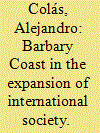

|
|
|
|
|
| Summary/Abstract |
From the ‘long’ sixteenth century the Ottoman regencies of North Africa operated as major centres of piracy and privateering across the Mediterranean Sea. Though deemed by emerging European powers to be an expression of the ‘barbarian’ status of Muslim and Ottoman rulers and peoples, piracy, and corsairing in fact played a major role in the development of the ‘primary’ or ‘master’ institutions of international society such as sovereignty, war, or international law. Far from representing a ‘barbarian’ challenge to the European ‘standard of civilization’, piracy and privateering in the modern Mediterranean acted as contradictory vehicles in the affirmation of that very standard.
|
|
|
|
|
|
|
|
|
|
|
|
|
|
|
|
| 2 |
ID:
148792
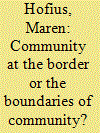

|
|
|
|
|
| Summary/Abstract |
This article contributes to the communities of practice (CoP) literature by focusing on the neglected role of the boundary in constructing community. It takes issue with advocates of International Relations’ (IR) most recent ‘practice turn’ who have overrated inclusive practices of linking to the detriment of taking account of exclusive practices of demarcation. A conceptual turn to the boundary, understood as a ‘site of difference’, highlights how the two sets of practices operate simultaneously in creating shared senses of belonging to a community. The article empirically probes this turn to the boundary by studying how the postmodern community of the European Union (EU) is (re)constructed by EU diplomats in its neighbouring state Ukraine. As a borderland, it symbolises an interstitial zone of high connectivity where the EU’s otherwise latent order is unearthed. A reconstructive analysis of interviews with members of this ‘community of practice’ reveals that they function as ‘boundary workers’ who engage in both boundary-spanning and boundary-drawing practices on an everyday basis. Zooming in on the ‘boundary work’ by EU diplomats exposes the complex process of community-building and thereby helps grasp community as an emergent structure of possibilities whose meaning is contextually mediated by its members’ social experience of the boundary.
|
|
|
|
|
|
|
|
|
|
|
|
|
|
|
|
| 3 |
ID:
148793
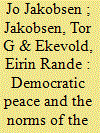

|
|
|
|
|
| Summary/Abstract |
The democratic peace literature has convincingly shown that democracies do not fight other democracies. Theoretical explanations of this empirical phenomenon often claim that the citizenry in democracies prefers peaceful resolution of interstate conflicts. Still, there is a dearth of studies exploring the public’s preferences and values directly. We seek to rectify this by investigating, in a novel way, the relationship between regime type and citizens’ bellicosity. A comprehensive multilevel research design is employed, with data spanning 72 countries over the period of 1981–2008. This enables us to test one of the theoretical mainstays of the democratic peace thesis, viz., that regime type helps shape individuals’ attitudes toward war-fighting. Our results lend special support to normative democratic peace theory: Citizens of democracies are significantly more pacifistic than citizens of non-democracies. This result upholds when we rigorously control for other relevant factors, including specific characteristics of individuals and rival theoretical explanations.
|
|
|
|
|
|
|
|
|
|
|
|
|
|
|
|
| 4 |
ID:
148788


|
|
|
|
|
| Summary/Abstract |
Neo-Kantian political theories, such as those developed by Jeremy Waldron and Anna Stilz, aim to provide an account of state legitimacy and territorial boundaries that avoids the problems faced by rival nationalist theories. Immanuel Kant’s own theory of the state appears to be biased towards the status quo, and therefore has difficulty in explaining what is wrong with rights-respecting colonialism or the annexation of one state by another. Two possible ways forward are explored. One involves making state legitimacy conditional on meeting more stringent standards of distributive justice. The other involves appealing to the idea of a self-determining ‘people’. However the latter must avoid collapsing into either a version of nationalism (if the ‘people’ are identified in cultural terms) or a form of voluntarism (if the ‘people’ are required subjectively to ‘affirm’ the regime that governs them). Thus neo-Kantian theories cannot deliver a plausible account of self-determination without, like Kant himself, tacitly invoking political identities of the kind that they seek to repudiate.
|
|
|
|
|
|
|
|
|
|
|
|
|
|
|
|
| 5 |
ID:
148789
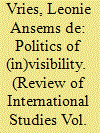

|
|
|
|
|
| Summary/Abstract |
This article explores the relationality of governance and resistance in the context of the constitution of refugee subjectivities in Malaysia. Whilst recognising their precarity, the article moves away from conceiving of refugees merely as victims subjected to violence and control, and to contribute to an emerging body of literature on migrant resistance. Its contribution lies in examining practices of resistance, and the specific context in which they emerge, without conceptualising power-resistance as a binary, and without conceiving of refugees as preconstituted subjects. Rather, drawing on the thought of Michel Foucault, the article examines how refugee subjectivities come into being through a play of governance-resistance, of practices and strategies that may be simultaneously affirmative, subversive, exclusionary, and oppressive. The relationality and mobility of this play is illustrated through an examination of practices surrounding UNHCR identity cards, community organisations, and education. Secondly, governance-resistance is conceptualised as a play of visibility and invisibility, understood both visually and in terms of knowledge production. What I refer to as the politics of (in)visibility indicates that refugee subjectivities are both constituted and become other than ‘the refugee’ through a continuous play of coming into being, becoming governable, claiming a presence, blending in and remaining invisible.
|
|
|
|
|
|
|
|
|
|
|
|
|
|
|
|
| 6 |
ID:
148785


|
|
|
|
|
| Summary/Abstract |
Constructivism has a problem in accounting for agent-led change and for what motivates agents to make up their minds about how to put their agency to use. I show that constructivism’s problem of change is related to tensions between constructivism’s own key assumptions about the mutually constitutive relationship between structure and agency, understanding of change and to an essentialist conception of identity. I argue that agency is constituted through processes of ‘identification’ involving identity and narrative constructions and performance through practice and action. I make the perhaps controversial move to regard ontological security as a precondition for agent-led change and to identify ontological security maximisation as functionally equivalent to rationalist theories’ agent assumption of utility maximisation. I identify two strategies for maximising ontological security: a ‘strategy of being’ to secure a stable and esteem-enhancing identity and a strong narrative; and a ‘strategy of doing’ to ensure cognitive consistency through routinised practice whilst also undertaking action contributing to a sense of integrity and pride. The article concludes that although humans are endowed with agency, their actual ability to utilise their agency is severely constrained by their need for maintaining ontological security, which may explain why change appears so difficult to achieve.
|
|
|
|
|
|
|
|
|
|
|
|
|
|
|
|
| 7 |
ID:
148791


|
|
|
|
|
| Summary/Abstract |
How has the salience of democratic governance varied as an issue and as a basis of social status in the United Nations General Assembly (UNGA) over time? International Relations (IR) scholars typically assume a high salience of democratic governance in international society after the Cold War, yet evidence suggests important fluctuations and that these assumptions should be qualified. This article presents quantitative and qualitative results of a manually-coded content analysis of the UNGA General Debates between 1992 and 2014, with comparison to 1982, illustrating variation in the frequency and content of state representatives’ references to democracy and the use of democratic governance as a symbol of status. What factors influence the salience of a given dimension of social status in an international organisation? Explanations supplement IR approaches with insights from social psychology, including the relevance of high and low identifiers, accessibility, fit, current and anticipated group status, and regional status concerns. The article analyses trends in states’ support for principles underpinning international order, which have broader implications for literature on global governance and status in world politics as well as for international democracy support.
|
|
|
|
|
|
|
|
|
|
|
|
|
|
|
|
| 8 |
ID:
148790
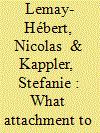

|
|
|
|
|
| Summary/Abstract |
The peacebuilding and academic communities are divided over the issue of local ownership between problem-solvers who believe that local ownership can ‘save liberal peacebuilding’ and critical voices claiming that local ownership is purely a rhetorical device to hide the same dynamics of intervention used in more ‘assertive’ interventions. The article challenges these two sets of assumptions to suggest that one has to combine an analysis of the material and normative components of ownership to understand the complex ways in which societies relate to the peace that is being created. Building on the recent scholarship on ‘attachment’, we claim that different modalities of peacebuilding lead to different types of social ‘attachment’ – social-normative and social-material – to the peace being created on the part of its subjects.
|
|
|
|
|
|
|
|
|
|
|
|
|
|
|
|
| 9 |
ID:
148786


|
|
|
|
|
| Summary/Abstract |
Review of International Studies has seen a debate over the value of security. At its heart this is a debate about ethics: concerning the extent to which security is a ‘good’ and whether or not security politics produces the kind of world we want. More recent contributions focus on the extent to which security is ‘positive’ or ‘negative’. However, this article argues that the existing debate is limited and confusing: key authors use the terms ‘positive’ and ‘negative’ in different, and, at times, contradictory ways. The article clarifies the roots of the existing debate, and then draws out two different uses of the terms positive and negative: an analytic frame and a normative frame. In response, it proposes a pragmatist frame that synthesises the existing uses, drawing on pragmatism and practice-centred approaches to analyse the value of security in context. The contribution of the article is thus twofold: it both clarifies the existing debate and suggests a solution. This is key because the debate over the value of security is crucial to thinking about how we want to live.
|
|
|
|
|
|
|
|
|
|
|
|
|
|
|
|
|
|
|
|
|